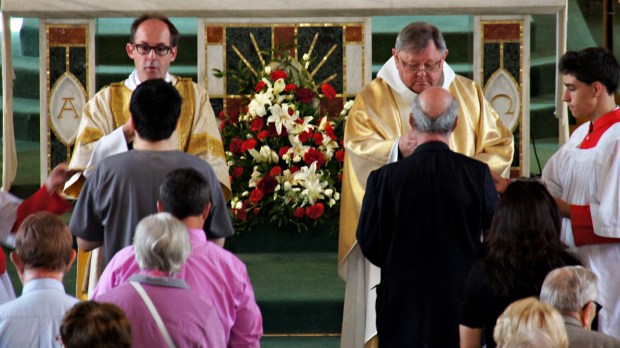When it comes time for the distribution of Holy Communion at Sunday Mass, the typical scene in the United States features an orderly procession of most all those present, shuffling down the main aisle to receive the Eucharist from a priest or lay minister. If a parishioner can’t make it down the aisle, someone comes to place the Eucharist in their hand or mouth.
It is extremely common in the United States for everyone in the church, without exception, to receive Holy Communion every Sunday of the year.
For most Americans this is typical, and the question of “How often should I receive the Eucharist,” seems like it doesn’t really need an answer. However, the Church in her wisdom has set out specific guidelines that are meant to help us along the path toward Heaven.
Strictly speaking Catholics are only required, at the bare minimum, to receive the Eucharist once a year.
“After [receiving their First Communion], each of the faithful is obliged to receive holy communion at least once a year. This precept must be fulfilled during the Easter season unless it is fulfilled for a just cause at another time during the year” (Canon Law #920).

Read more:
7 Tips for a good confession, from a saint and spiritual guide
It may seem a bit odd that we are only asked to receive the Eucharist once a year during the Easter season. However, this precept of the Church is meant to remind us of the necessary conditions that we must fulfill in order to receive the Holy Eucharist in a worthy manner. The USCCB gives a succinct explanation that is often found in the back of a parish’s missalette.
“As Catholics, we fully participate in the celebration of the Eucharist when we receive Holy Communion. We are encouraged to receive Communion devoutly and frequently. In order to be properly disposed to receive Communion, participants should not be conscious of grave sin and normally should have fasted for one hour. A person who is conscious of grave sin is not to receive the Body and Blood of the Lord without prior sacramental confession except for a grave reason where there is no opportunity for confession. In this case, the person is to be mindful of the obligation to make an act of perfect contrition, including the intention of confessing as soon as possible (canon 916). A frequent reception of the Sacrament of Penance is encouraged for all.”
The Church has stressed in recent years the frequent reception of the Eucharist, but it is never to be isolated from the sacrament of Confession. Basically, if after a proper examination of conscience you feel that you are free of any grave sin, then the Church suggests that you should receive the Eucharist, the “source and summit” of our faith.

Read more:
What makes a sin “grave”?
However, if you are conscious of a grave sin, then the Church asks you to refrain from receiving Holy Communion and either remain in the pew, or approach the priest with arms crossed over your chest as an indication that you would prefer a blessing instead of the Eucharist.
The Church would hope you go to confession as soon as you are able, in order to bring your relationship with God back in order.

Read more:
3 reasons to go to confession ASAP

